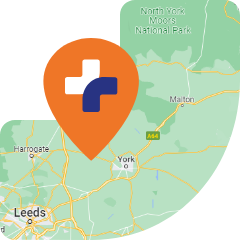What is an infected insect bite?
An insect bite is not usually serious, and they often get better on their own within a few days. However, they can sometimes become infected, or cause an allergic reaction.
What are the symptoms of an infected insect bite?
An insect bite may be painful at the site where you’ve been bitten. It usually looks like a small, swollen lump on the surface of the skin.
If the bite is infected, you may:
- Notice the area around the skin becomes increasingly red, swollen and warm
- Have symptoms similar to that of a wound infection, such as a pus-like discharge or increasing pain at the site of the bite
- Experience increased itchiness
- Develop a high temperature
- Have swollen glands
- Start to experience flu-like symptoms
Who qualifies for a Pharmacy First Insect bite condition appointment?
- Patients registered with a GP
- Individuals with the symptoms listed above
- Ages 1 year and over
What causes an insect bite to become infected?
An insect bite can penetrate the skin, meaning that bacteria could potentially enter the body via the infected area of the bite. This can happen if you scratch the bite and damage the skin’s protective barrier, leaving an open wound for bacteria to enter. As a result, the bite can become infected.
There are certain insects that can cause infection and illness. For example, a tick bite can cause Lyme disease, mites can cause scabies and mosquitoes from certain parts of the world can carry malaria.
How to prevent an insect bite from becoming infected
To prevent an insect bite from becoming infected, you should take measures to avoid getting bitten in the first place. There are a number of ways you can protect yourself from insect bites, including:
- Using insect repellent
- Keeping your skin covered when spending time outdoors
- Stay calm if you notice an insect nearby and back away slowly
- Avoiding certain places at times of the day when insects are prevalent
- Making sure you have your travel vaccinations
To lower the risk of the bite from becoming infected, you should wash your skin with soap and water. You should also avoid touching or scratching the bite.
How to treat an infected insect bite
If you have an insect bite and you suspect that it may be infected, you should:
- Place a clean flannel soaked in cold water on the affected area – this will help bring down any swelling
- Take painkillers, such as paracetamol or ibuprofen, if it feels particularly painful
- Use an antihistamine to relieve itching
- Use hydrocortisone cream to soothe itching and reduce swelling
In some cases, an infected insect bite may require further medical treatment.
How can Pharmacy+Health help?
If you have been bitten and you think it might be infected, Pharmacy+Health are here to help.
As part of the NHS Pharmacy First service, our highly qualified and experienced pharmacists are able to assess your symptoms so that they can then recommend the most suitable infected insect bite treatment for you. This scheme means our team can suggest effective solutions to help soothe your discomfort so that your bite heals in no time.
We offer a range of options, including spider bite, tick bite, midges bite and flea bite treatment, in addition to wasp sting, bee sting and hornet sting treatment. Our pharmacists can suggest which painkillers, medicated creams and antibiotics could help alleviate your symptoms, including treatments that are usually only available via prescription from your GP.
Find your local Pharmacy+Health and visit us in-store today.
Book a pharmacy first appointment today
Our fully qualified healthcare experts are here to help you if you or your child suffer from Infected Insect Bites. We provide consultation appointments and treatments for Shingles and many other common health conditions. Our expert pharmacists provide clinical advice and will recommend the most suitable treatment for you.
So, for information, advice and Infected Insect Bites treatment, book a pharmacy appointment with us today. We’re here to make accessing healthcare quicker, easier and more convenient.
![]()




